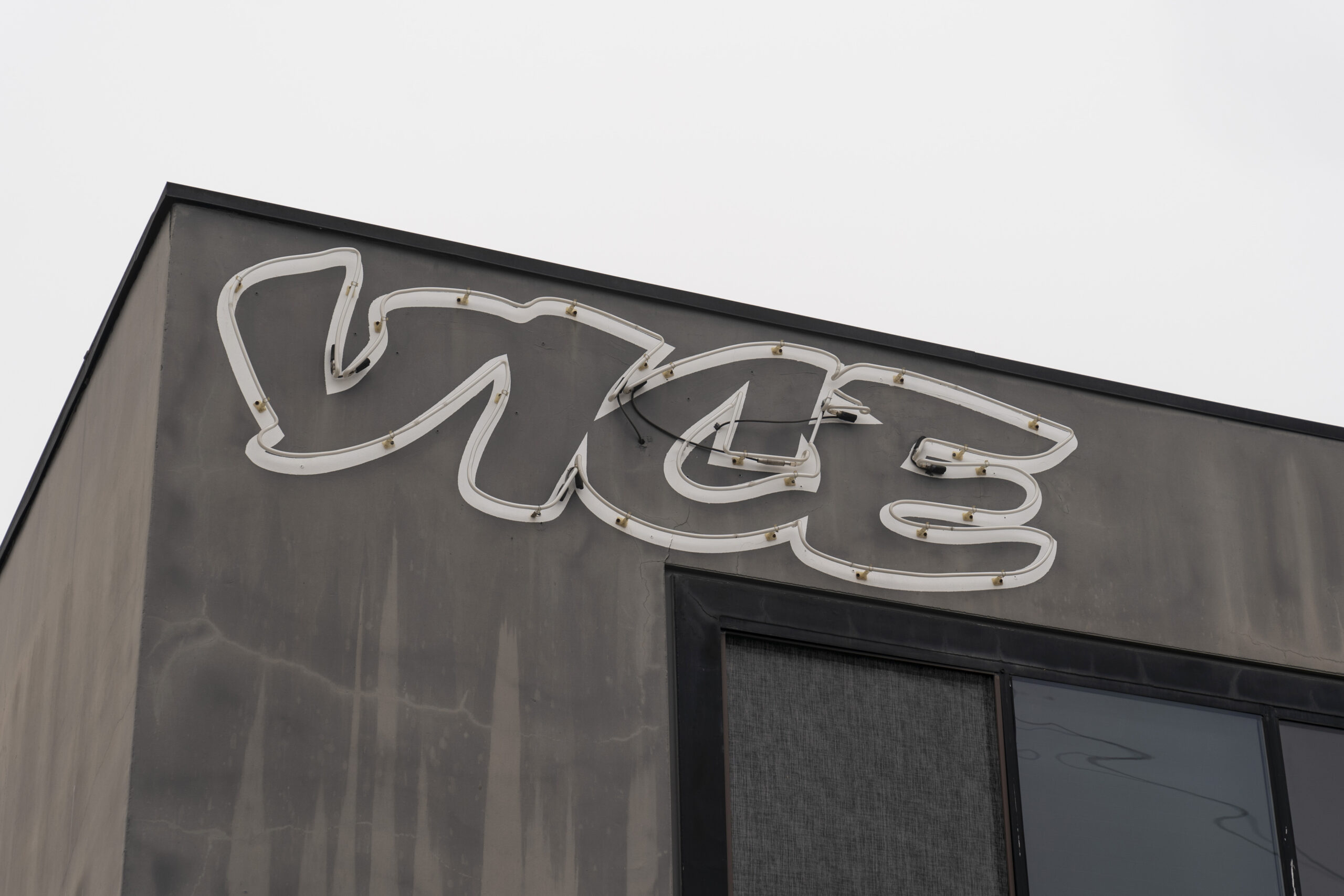
AP Photo/Jae C. Hong
Once deemed an “all-conquering empire,” the Vice brand enjoyed a remarkable stretch of power and influence over the last 20 years. Now, the media company enters a period of incalculable uncertainty.
Vice Media Group — encompassing the namesake brand, several other media publications such as Refinery29 and Garage Magazine, and multiple video production companies — filed for bankruptcy on May 15. Now, a buyer is lined up, but ongoing financial woes and leadership turmoil has the newsroom on edge about the future.
The bankruptcy proceedings have allowed the company to continue operating while staving off collection or accruing interest on its significant debts. But steep bloodletting has continued regardless. On Friday, Vice COO Cory Haik told staff the company will be shutting down internal messaging service Slack and moving to Google Chat as “part of a wider effort to reduce costs,” according to an email reviewed by Mediaite.
In Vice’s initial bankruptcy filing, they reported that they owed Salesforce, the corporate owner of Slack, about $515,927 in unsecured claims. Based on those filings, Vice Media also owes tens of millions of dollars to IT and digital services providers Wipro and Workday, accounting firm Ernst & Young, and fellow media entities HBO and CNN, among several others.
The New York Times reported earlier this month that a group of buyers led by Fortress Investment Group — one of several lenders to whom Vice Media owed significant money to — bid $350 million to purchase the company out of bankruptcy. In a note to staff, Vice’s current co-CEOs Bruce Dixon and Hozefa Lokhandwala, said they would seek approval for the Fortress bid.
The deal is not finalized yet and will need approval from a bankruptcy judge before any official ownership changes take place, but it would set Vice on a new path after a period of profound uncertainty.
“To say morale is low is kind of an understatement,” a Vice editorial staff member told Mediaite. “Most of my remaining colleagues have lost count of how many rounds of layoffs they’ve survived at this point, and nobody in upper management seems capable of reassuring us. Even if they did, I wouldn’t believe them.”
“There are just a lot of unknowns,” they added. “Depending on the terms of the sale we could be business as usual or completely screwed. Nobody really has answers.”
Vice and its subsidiaries continue to operate — some have even debuted partnerships and new shows. But in the background, the company has enacted a series of layoffs in recent months, with the most recent wave coming in April. And since financial actions are restricted during bankruptcy proceedings, most of those former employees “are yet to receive a single dollar in severance,” according to Vice’s union. This week Vice filed for permission from a bankruptcy court to pay wages and severance owed to past employees, but the timeline for that to actually happen remains unclear.
Some ex-employees are surviving off the generosity of their colleagues. A fundraiser on GoFundMe started by former Vice editor Sara David has amassed more than $31,000 from nearly 350 donors as of this writing.
Meanwhile, the company has also cut back on its use of freelancers.
“We’ve had to stop commissioning freelancers because we are not sure they will get paid in the contractual time, at least on the editorial side,” the Vice employee said. “I’ve heard some contractors have started getting paid out for money owed, so that hopefully means the system is working now and everyone else will get paid soon, but who knows.”
The company’s financial woes have led to deals that have raised eyebrows among the rank and file.
In January, Vice struck a content deal with MBC Group, one of the largest broadcast corporations in the Middle East that is majority-owned by the government of Saudi Arabia (although MBC is considering going public.) Vice stopped operating in Saudi Arabia following the death of Jamal Khasoggi in 2017, but since re-established an office in Riyadh.
“There was great internal opposition to the company starting to work with Saudi Arabia,” a former Vice employee said. “As a country that attacks journalists, that goes against our entire journalistic body of work and everything that the editorial team stands for, but with Vice taking in water, it decided to do a deal with the devil.”
The deal is likely to remain a source of contention among staff and a headache for future owners.
Vice’s march from billion-dollar media empire to bankruptcy was not a quick one. In fact, sources who spoke to Mediaite says years of mismanagement are to blame.
One former Vice employee who worked at the organization during the 2010s and 2020s told Mediaite: “Make no mistake, Vice’s downfall is, by and large, due to year after year of terrible business acumen, terrible leadership, terrible decision-making, and the staff had to suffer at every turn.”
“Staff suffered through layoffs and young stars losing jobs — even though they had the brighter ideas — [and] management was bizarrely protective of more mediocre, senior people who wanted to control a lot,” they added. “Vice Media’s Union deserves every praise. Frankly, Vice would have gone to shit long ago if it wasn’t for the union.”
Two Vice co-founders, Shane Smith and Suroosh Alvi (the third being Gavin McInnes, who has become more known for his creation of a neo-fascist group that is designated as a terrorist organization in several countries), are still part of the organization, though it remains unclear what role they will play going forward. Smith in particular has long been a source of criticism for the excesses of the company.
At the height of its rise from provocative indie magazine to global media empire in the 2010s, Vice was largely known for its work in foreign affairs journalism and video production. Thanks to a young audience and the prodigious salesmanship of Smith, the company attracted major investments that inflated its valuation to jaw-dropping levels.
Smith and Alvi’s cultural ferocity and risky strategy-making found them allies within the upper echelons of the industry, such as former Viacom CEO turned Vice board member Tom Freston, who greenlit one of Vice Media’s first major deals with MTV; former News York Post publisher Jesse Angelo, who would leave News Corp. to become a Vice Media exec in 2019 before departing this year to start his own company; and once-CEO of the A&E Networks Nancy Dubuc, who would invest hundreds of millions into Vice Media and serve on its board before later becoming the organization’s CEO herself. (She announced her departure from the role in February.)
Some were skeptical, even at the time. “When I first started writing about Vice Media, Shane Smith was a self-proclaimed billionaire,” Daniel Voshart, a critic of Vice and publisher of the blog NotVice.com, told Mediaite. “Eight years ago I called BS. Today his company is going bankrupt.”
As Axios media reporter Sara Fischer noted on Mediaite podcast The Interview in May, “Vice raised well over a billion dollars, We’re talking an extraordinary amount of money, and they did it at these very lofty valuations… They were always overinflated.”
Vice Media also became known for embarking on frenzied venture sprees with a range of partners and sponsors – including, at various times, HBO; Hulu; Showtime; Spotify; CNN.com; food companies in malls; and even beauty brand strategists — not to mention drawing significant investments from Disney, News Corp. and Soros Investment Fund, the firm for philanthropist George Soros.
Vice Media’s reliance on these deals for revenue would later contribute to its rapid decline; the international vertical Vice World News was shut down shortly after Antenna, a Greek broadcasting company that was a founding investor, refused to continue supporting the imprint. According to a former Vice employee, “A senior leader promised them a very impossible number of followers that Vice World News would reach by the end of year” after their launch in 2020, “and in order to reach this arbitrary number that was not realistic, six figures were dumped in paid media because of a terrible business decision, that then lost the company six figures. Imagine having those six figures back when you’re filing for bankruptcy.”
Based on years of questionable operational decisions, financial pressure, and a culture of harassment and intimidation that thrived under Smith and other executives, all of those who spoke to Mediaite agreed that Vice will continue to run into a host of issues of its own making, no matter who’s at the helm.
“The lazy thing to do in all this would be to blame their failure on some larger media apocalypse,” said Voshart. “This might explain BuzzFeed’s current struggle… but BuzzFeed was able to pass the regulatory checks of going public because it is a real company with a real audience.”
“Vice Media has tried to go public for over a decade,” he said.
Even if Fortress’ bid goes through, the company is a long way from profitability. Significant chunks of the business will likely need to be sold off or spun out into separate entities in order to keep Vice afloat.
“They’re making about $600 million a year. It’s not that it’s a non-business — the problem is, who wants to buy that business and then be responsible for managing all that debt?” Fischer said.
On one hand, Fortress acquiring Vice out of bankruptcy will likely allow them to operate the company without being directly responsible for the debt it accrued prior – including money owed to staffers and contractors.
That said, there remain concerns about the new overlords will run the business.
“The bankruptcy process seems to be wrapping up soon now that there’s a buyer, but nobody knows what will happen after the handoff,” said the Vice staffer. “On the other hand, we’ve seen what happens to other media companies after financial capital goons take over. These people typically don’t give a shit about journalism. Like so many other things these days, we are just playing cards in their casino gambling racket.”
The former Vice staffer agreed.
“What we’ve seen from Gizmodo Media Group and Deadspin is that when you have a changing of the guard in executive leadership, the goal often becomes to sell the company for parts, or to make the most money and use the least labor as possible. I really fear that there will be only further and further layoffs.
“Vice will inevitably become a ghost of itself,” they concluded.
Have a tip we should know? [email protected]

